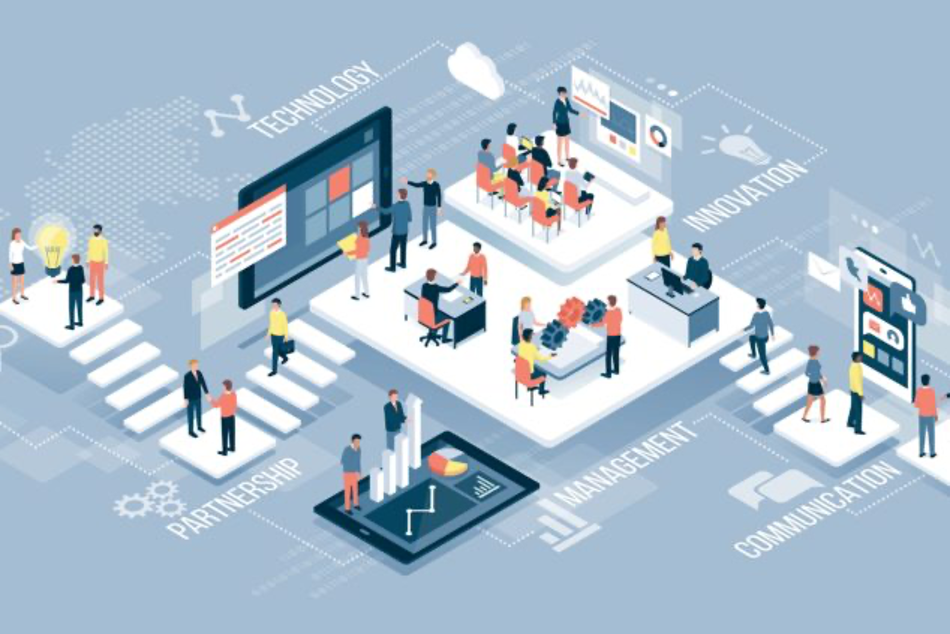 Five years from now, how will we look back at 2020? Will we have grasped the opportunities that lie before us? David Mott questions the idea of the office and examines new models emerging in the start-up community As a venture capitalist, I have been in many board meetings in recent months where we have discussed new ways of working and this has led to a social anthropological fascination of the future of work in the start-up community and what the start-up office might look like. Looking at history, the concept of the office goes back to December 31, 1600 with the formation of the East India Company which set up its administration with rows of clerks keeping ledgers and tracking data. The format continued largely unchanged for hundreds of years. The invention of the typewriter and copying machines improved productivity and created more admin. My grandfather worked with IBM when electronic typewriters started to become computers which launched the next major advance in productivity in the office. My Dad introduced me to the first mainframe computer which filled up a whole room and could run basic programmes. And I started my career adding up handwritten columns of numbers with a calculator before we were issued with laptops and Excel. But despite these technological advances, the workplace had not changed. Some more progressive companies redesigned common areas to look more like cafés offering free food and table tennis – the cynics argued that it was a plan to encourage people to stay in the office for longer. Armies of workers continued to show up five days a week to make the wheels of commerce turn. The COVID-19 pandemic has changed the rules. The older generations of leaders who have been institutionalised in a low-tech environment over decades of commuting and office routines have been set free and we have woken up to the wonders of remote working. Teams and Zoom, while not perfect, have unshackled us all from the office. Many millennials had already pioneered the way for us by creating an international army of digital nomads, but this was seen by the majority as a way of avoiding a “real” job. But now, we try to learn from them and their experiences. This is good for us all and a huge opportunity to make a historical change. What is an office for? What is an office today? An empty building? A skeleton? A relic of the past? Or is it a place to socialise and bond with people who share a common goal and culture? A place to connect and exchange knowledge. A place to learn and to teach. A collaboration space. It is no longer a place where we are expected to be for set hours with rigid schedules of meetings. No one wants to go back to that. Almost everything we used to do can now be done from anywhere. From home, a cafe, a friend’s place, a co-working space near home. It does not have to be your bedroom or kitchen table; we can expand our horizons and opportunities. After all, JK Rowling wrote Harry Potter from a café. Of course, for some professions, location is central and vital to the activity and not easily reinvented. But for office workers, we are looking at a blank page and our pencil is sharpened. Perhaps work is a bit like religion. I know I can pray from anywhere. But sometimes it is nice to congregate somewhere special and worship together. If we are all so far apart it is harder to do that. You can’t be a part of your local football team or dance troop if you are never there. Those bonds will weaken over time. So, we have an incredible opportunity before us. To redefine the way we work and rewrite the rules. In five years, we want to look back and say: “I was part of it. I helped to change the game.” But to do that well, there are some things to think deeply about. When I started my career, I learned so much from being around others – bonding with my graduate intake, being shown the ropes by the senior associates and learning from the managers and leaders who shared their experience. Training and mentoring are critical to building great teams, whether in a start-up or mature business. And coaching these teams is vital. It is no coincidence that the best teams in the world have coaches to help individuals and the group deliver great performances. So, we need great online tools to help us with this and we need to use the time when we do get together to work on team performance. Perhaps that will give us the sense of purpose that we need for when we gather in the start-up “office.” 5 models for the start-up office of the future Some models for the future start-up office are emerging.
How will you play your part in this change? David Mott is founder partner at Oxford Capital, a venture capital investment manager. He is chair of the BVCA Venture Capital Committee This blog features in Growth Business on 21/9/2020 https://www.growthbusiness.co.uk/5-models-for-the-start-up-office-of-the-future-how-the-office-will-change-2558049/
0 Comments
Leave a Reply. |
About meCo-founder of Oxford Capital Partners. Husband, father, adventurer and polar marathon runner. Represent Great Britain at master level in Modern Pentathlon. Archives
May 2023
Categories |

